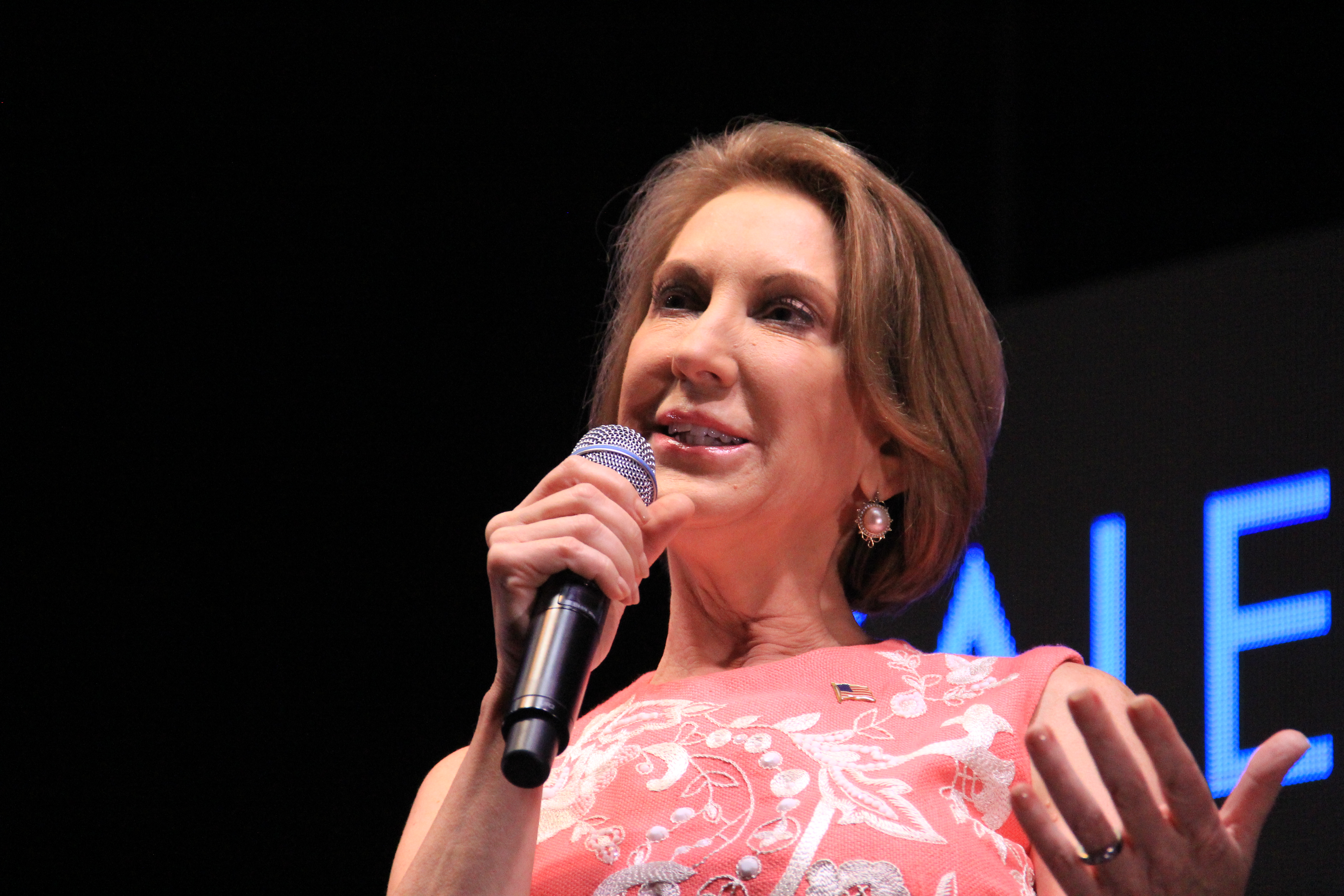As Carly Fiorina makes gains in the polls, she’s touting her global corporate experience as an indicator of how she would handle foreign policy issues if she were to win the White House.
Seasoned diplomatic experts, however, are not convinced Fiorina’s experience as CEO of Hewlett-Packard directly translates to global affairs.
“No doubt Carly Fiorina knows many foreign leaders in both the private and public sectors, which is an important advantage,” said William Galston, a former policy adviser to President Bill Clinton and an expert on governance studies at the Brookings Institution, a nonprofit research organization. “But such personal relations are no guarantee of effective diplomacy.”
Recent data from Public Policy Polling in Missouri and Iowa show Fiorina leaped from No. 14 into the top five of the 17 Republican presidential after GOP debate in Cleveland Aug. 6.
Fiorina often cites her familiarity with the technology industry and her experience leading international businesses to underscore that she is more accomplished than Democratic front-runner Hillary Clinton.
“Like Mrs. Clinton, I, too, have travelled the globe. Unlike Mrs. Clinton, I know that flying is an activity, not an accomplishment,” Fiorina said at CPAC this year. “I have met Vladimir Putin and I know that his ambition will not be deterred by a gimmicky red reset button.”
Galston hears echoes of former President George H. W. Bush in Fiorina. Bush combined a dense network of international relationships with a deep understanding of the international political system and clear, realistic objectives for American foreign policy.
“That’s why he was able to end the Cold War and reunify Germany without firing a shot, as well as creating an international coalition of unparalleled breadth and legitimacy to repeal Saddam Hussein’s aggression in Kuwait,” he said. “It remains to be seen whether Ms. Fiorina brings this kind of clarity and realism to foreign affairs.”
Stephen Orlins, president of the National Committee on U.S.-China Relations, also questions Fiorina’s objectives for American foreign policy, especially her vision of China as a rising adversary of the nation.
“Calling China a rising adversary of the United States and lumping China with Iran, Russia and ISIS as the big human rights tests of our time suggests she did not develop a nuanced view of China during her time as the CEO of HP, a corporation that does a great deal of business in China,” Orlins said. “It also highlights her willingness to engage in inaccurate hyperbole to connect with a fringe of the Republican Party.
“If China is as bad an actor as she now says, then why didn’t she force HP to stop doing business there?” he said.
“One doesn’t become a presidential candidate or a successful one just because of one’s knowledge of foreign affairs or knowledge of domestic issues,” said Mark Katz, professor of Government and Politics at George Mason University.
“Honestly, she probably wouldn’t be seen as having that much knowledge of that,” he said. “But then enough of our other presidents have not. Obviously Obama, George W. Bush, Clinton – none of these guys had an awful lot of background in this particular area but they learned or didn’t learn quick enough.”
Fiorina became the first woman leader of a Fortune 500 company when she was named Chief Executive Officer of Hewlett-Packard in 1999.
While the company grew rapidly during her tenure, Fiorina was criticized for laying off 30,000 people and for supporting a merger with rival computer giant Compaq over the objections of the HP board, shareholders and analysts. After the merger, she was asked to resign in 2005.
Fiorina also served as chair of the CIA’s External Advisory Board under President George W. Bush, and has done advisory work for the CIA, the Pentagon and the National Security Agency.
“Just doing business encompasses an awful lot,” Katz said. “You have to be familiar with trade issues, international tax issues… so much of international affairs is economics-oriented, so presumably she’d have a tremendous degree of familiarity with that.”
Katz thinks both China and Russia would like to deal with a pragmatic American president, whether they are a republican or a democrat.
“It should be more of an expectation that she [Fiorina] is pragmatic, which is something I think they’d welcome,” he said.
Even Fiorina has many diplomatic advantages over other candidates, “it’s not clear it will help her get elected,” he said, because “American voters are notorious for not being interested in foreign policy issues.”
“It might help her if she gets the job, but I’m not sure it will help her get the job,” he said.


